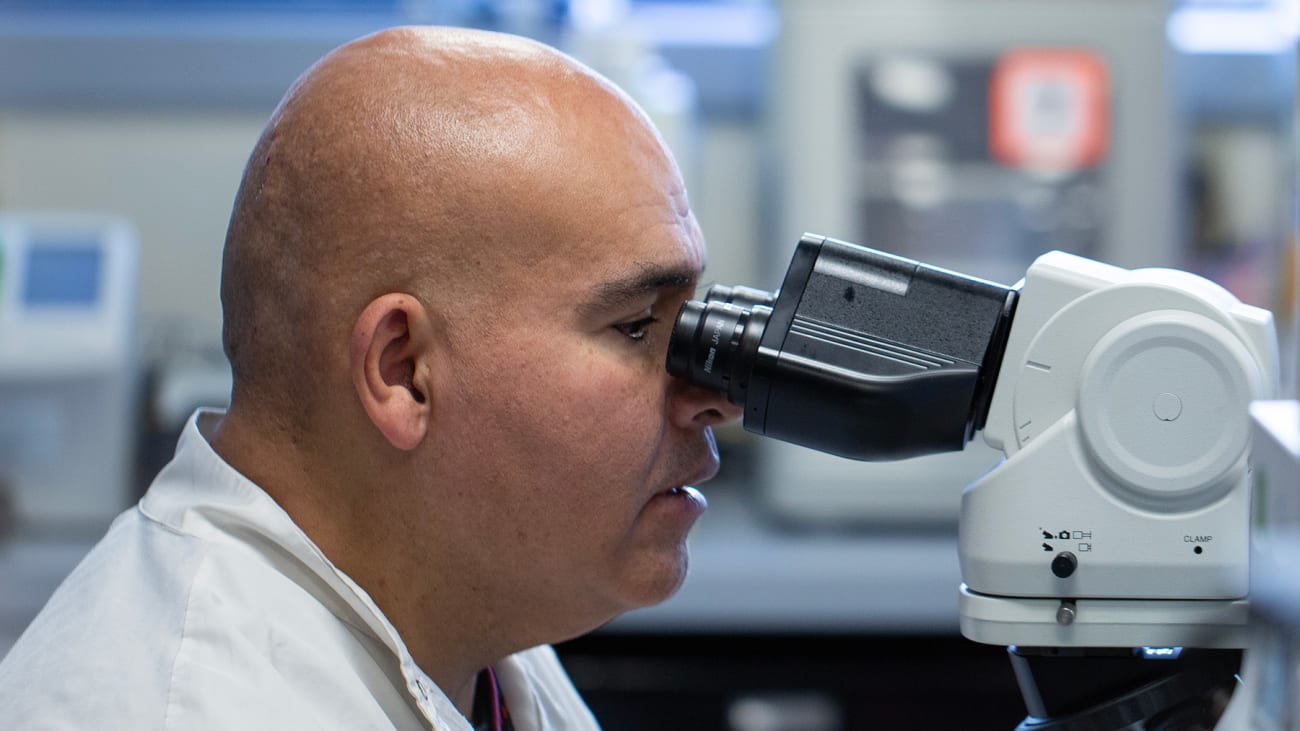

For many diseases, the story of who they affect and why they emerge is written in our genes. Through genetic testing, people can learn their risk for these diseases and take steps to prevent them or minimize their impact.
That’s one reason we launched The Gene Health Project, which is enlisting 100,000 volunteers to donate blood or saliva samples and have their entire exome sequenced — at no cost to the patients. More than 39,000 have already volunteered, yielding hundreds of diagnoses of rare diseases that people might not have discovered until they’d progressed.
Fifteen other centers are conducting similar projects, forming a network to create the world’s largest and most diverse and enriched biobank. In the future, this biobank will enable research of key questions about disease risk and pathology. Having patients’ DNA on file will also help providers make more precise care decisions, including prescribing medications that are safe and effective for every individual.
“The Gene Health Project will help introduce a new era of personalized medicine — starting today, with screening for three life-threatening but treatable diseases,” says Anwar Chahal, MD, PhD, FRCP, cardiologist, director of the Center for Inherited Cardiovascular Disease at WellSpan Health, principal investigator of The Gene Health Project as well as co-medical director of Precision Medicine.
Today: Making more life-saving diagnoses
Within weeks of donating their sample, volunteers find out their risk for three diseases:
- Familial hypercholesterolemia (FH), an inherited form of high cholesterol that increases the risk of heart attack and stroke
- Hereditary breast and ovarian cancer syndrome (HBOC)
- Lynch syndrome (LS), which increases risk of colorectal and other cancers
Nearly 2 million people in the U.S. carry the genes associated with these diseases, but many of them are unaware. "A physician usually makes about three or four life-saving diagnoses per year. In the first 18 months of this project, we have made 450,” says David Kann, MD, MPH, medical director of Precision Medicine at WellSpan Health and a cardiologist who specializes in lipidology.
A man finally understands his high cholesterol
One volunteer lived with high cholesterol for years that he couldn’t explain. By donating to the The Gene Health Project, he learned he carries a mutation for FH.
He was referred to Dr. Kann for care, and since then has made significant improvements in diet and exercise to lower his risk of complications.
“The risk hits home when people learn it’s in their genes. They commit to tackling areas of their health they can control,” says Dr. Kann.
A new mother treats her HBOC
A young mother discovered through the project that she carries the genetic variant associated with HBOC. She received a mammogram, discovered a mass, and proceeded to have a double mastectomy that may have saved her life.
“Without volunteering, she wouldn’t have known about the cancer until it had progressed,” Dr. Kann says.
A genetic counselor also explained the odds that family members might carry the same variant and wrote letters for the volunteer to give to her relatives.
“We hope that people will take advantage of genetic counseling so we can screen and identify even more at-risk individuals who can make the same preventive health decisions,” says Megan Betts, MS, CGC, program director of Precision Medicine at WellSpan Health.
Free genetic counseling is available to every volunteer with a positive result. Genetic counselors specialize in pediatrics, maternal fetal medicine, oncology, cardiology and other areas.
Tomorrow: Informing better care decisions
Genetic data for each volunteer provides valuable insights for them and their care teams regardless of their risk for Tier 1 diseases. The project saves volunteers’ data securely and attaches it to their electronic health record for physicians to query when they have questions about medication and other care decisions.
For example, dofetilide and flecainide are used to treat patients with atrial fibrillation, but about 1 in 10 people has a potassium or sodium channel mutation respectively or a pharmacogenomic change that can make the medication deadly.
“If your DNA is on file, we can query the system, identify your risk, and prescribe the best medication for you,” Dr. Chahal says.
Volunteers’ data is also added to a biobank to fuel research that may help crack some of the biggest mysteries in medicine.
“Who has a stroke or heart failure with atrial fibrillation? Who has atrial fibrillation but no strokes and no heart failure? When we add genetic data to the typical clinical data we have on patients, then we can make strides in prediction and prevention that significantly improve lives,” says Dr. Chahal.
Patients can learn more about The Gene Health Project and enroll at wellspan.org/GeneHealth.
If you have questions about The Gene Health Project, please call 717-356-5395 or email GeneHealthProject@WellSpan.org.
